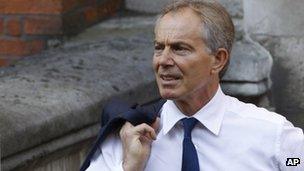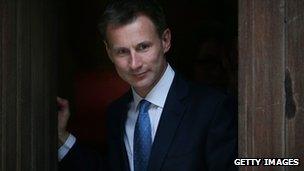Leveson Inquiry: Summary of week 22
- Published

Tony Blair's session was briefly interrupted by a protester
Several senior politicians appeared this week at the Leveson Inquiry - starting with former Prime Minister Tony Blair and ending with Culture Secretary Jeremy Hunt.
<link> <caption>Mr Blair defended his friendship with News Corp boss Rupert Murdoch</caption> <url href="http://www.bbc.co.uk/news/uk-18228898" platform="highweb"/> </link> , saying it had been "a working relationship" until he left office.
"It was a relationship about power," said Mr Blair. "I find these relationships are not personal; they are working [relationships], to me."
He said a close relationship between press and politicians was inevitable but also involved a "certain level of tension".
His session was briefly <link> <caption>interrupted by a protester</caption> <url href="http://www.bbc.co.uk/news/uk-18254023" platform="highweb"/> </link> despite the security at the Royal Courts of Justice.
David Lawley Wakelin was wrestled to the ground, but not before demanding that Mr Blair be arrested for war crimes. Mr Wakelin was released without charge, and Lord Justice Leveson ordered an inquiry into the intrusion.
On Tuesday, <link> <caption>Business Secretary Vince Cable revealed to the inquiry that "veiled threats"</caption> <url href="http://www.bbc.co.uk/news/uk-18260689" platform="highweb"/> </link> had been made against the Liberal Democrats when he was assessing Mr Murdoch's News Corporation bid for BSkyB in 2010.

Jeremy Hunt was the sole witness on Thursday
Mr Cable was removed from his role after being secretly recorded by undercover journalists saying he had "declared war" on Mr Murdoch - comments he put down to "pent-up feelings".
In his witness statement to the inquiry, Mr Cable said his references to a "war" were "making the point, no doubt rather hyperbolically, that l had no intention of being intimidated".
Mr Cable's role overseeing the BSkyB bid was handed to Mr Hunt, who appeared as the sole witness on Thursday.
<link> <caption>Education Secretary Michael Gove argued that the case for more regulation of the press</caption> <url href="http://www.bbc.co.uk/news/uk-18245965" platform="highweb"/> </link> needed to be very strong "before we further curtail liberty".
He said he was "concerned about any prior restraint and on their [journalists'] exercising of freedom of speech."
He said existing laws should be used to judge individuals and institutions.
<link> <caption>Mr Hunt's appearance involved lengthy discussion of his relationship with News Corp</caption> <url href="http://www.bbc.co.uk/news/uk-18273297" platform="highweb"/> </link> executive James Murdoch and News Corp official Frederic Michel, including text message exchanges.
One text was sent to Mr Murdoch just hours before the minister was asked to oversee the firm's bid for BSkyB.
But Mr Hunt said he would not have sent the text to Mr Murdoch had he known he would be given responsibility for the bid later that day.
Mr Hunt told the inquiry he had been "sympathetic" to the bid, but had "set aside" his views once he had been given the role, and denied News Corp had had influence within his office.
Mr Hunt also defended his special adviser's contact with Mr Michel, saying he was "totally shocked" by the volume of contact from Mr Michel, and described one particular text as "pushy" and "cheeky".